北师大版(2019)选择性必修 第一册Unit 1 Relationships Lesson1 Teachers mine 课件-(92张)
文档属性
| 名称 | 北师大版(2019)选择性必修 第一册Unit 1 Relationships Lesson1 Teachers mine 课件-(92张) | 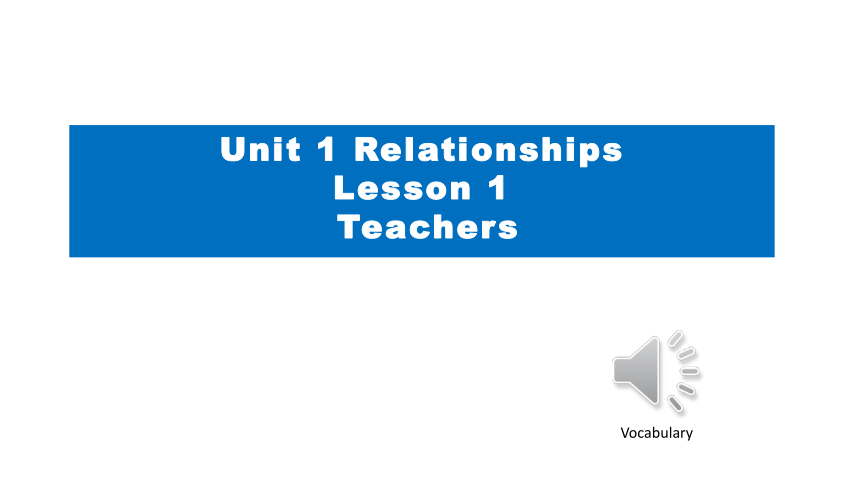 | |
| 格式 | pptx | ||
| 文件大小 | 12.5MB | ||
| 资源类型 | 教案 | ||
| 版本资源 | 北师大版(2019) | ||
| 科目 | 英语 | ||
| 更新时间 | 2023-10-06 14:57:23 | ||
图片预览

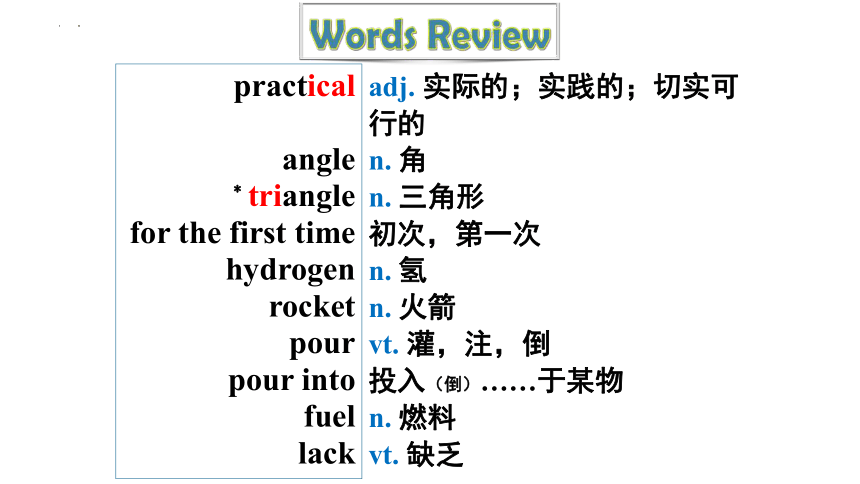
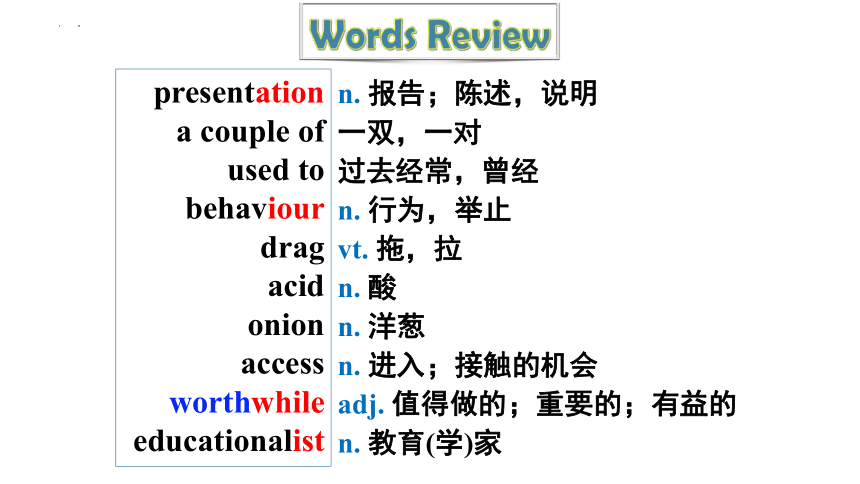
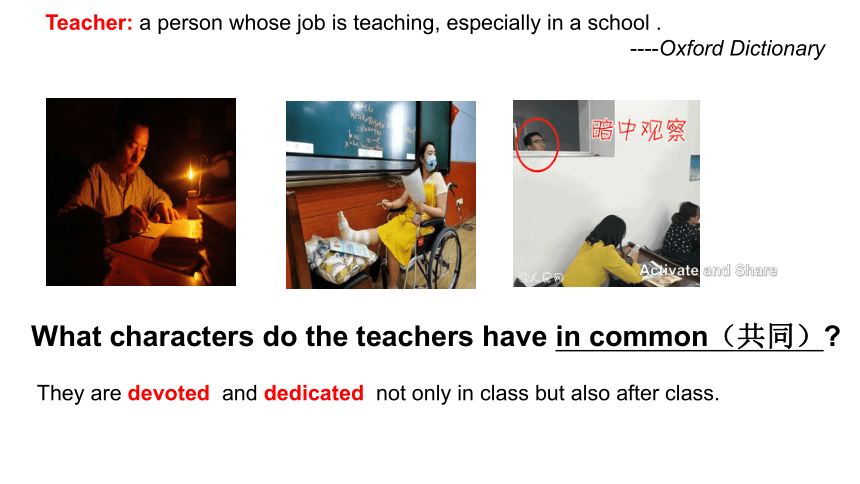
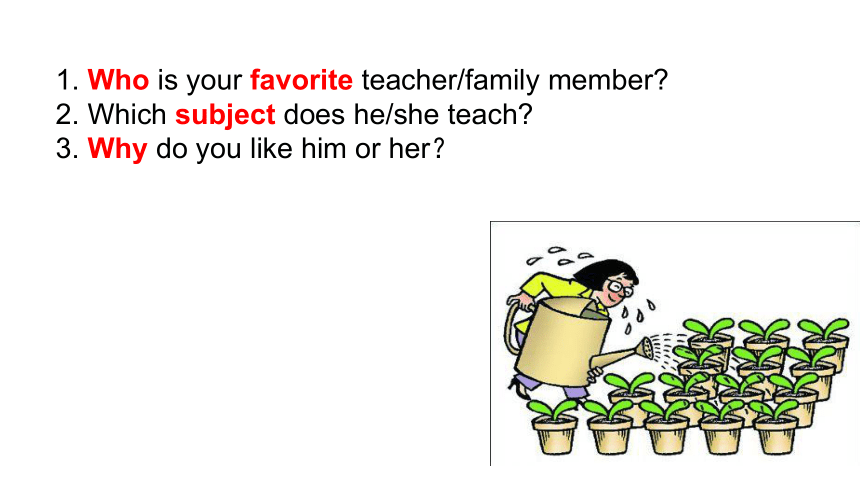
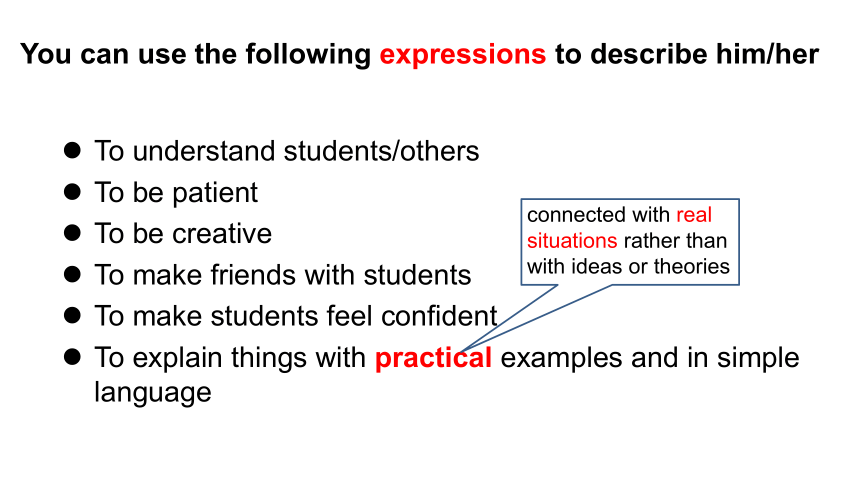

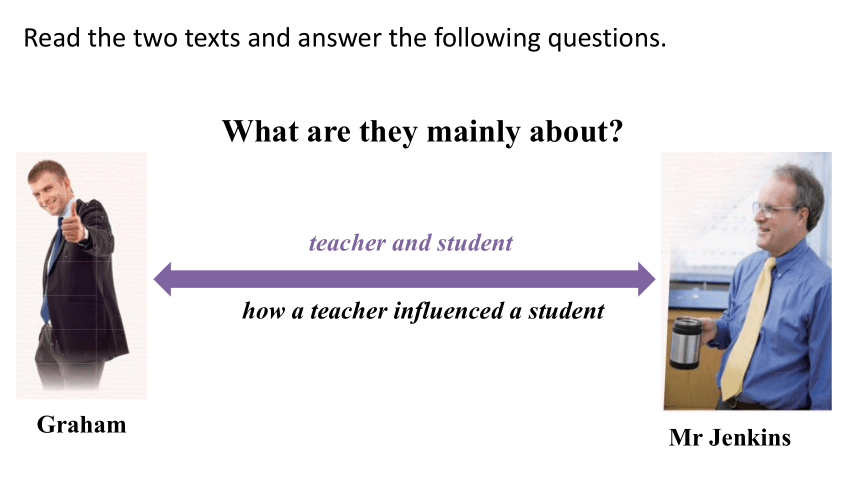
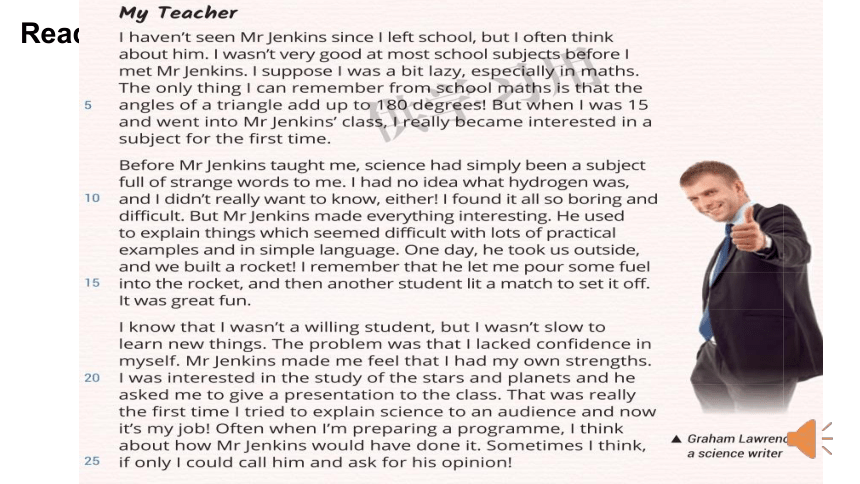
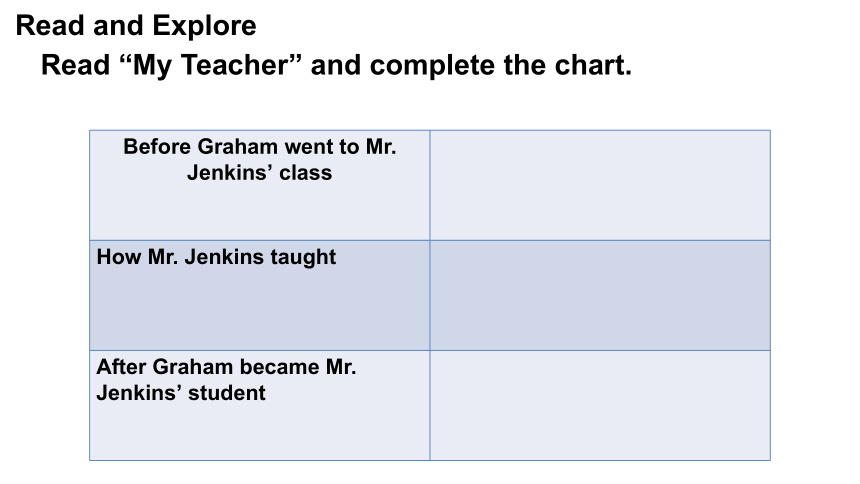
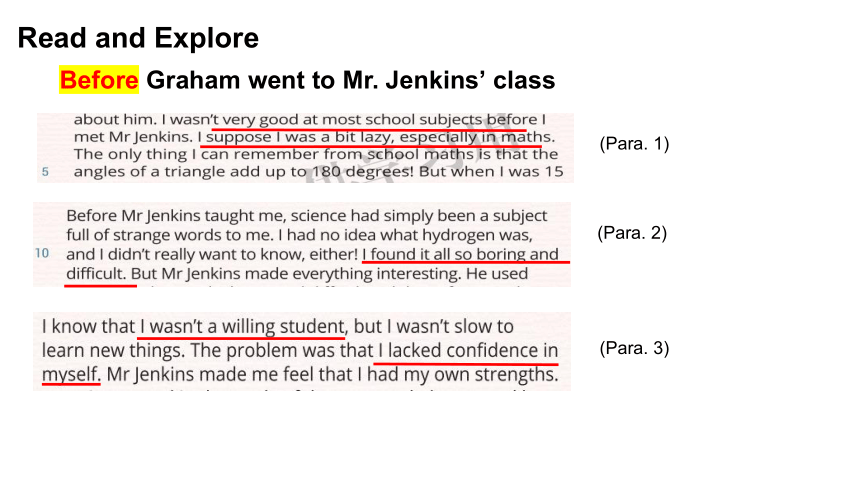

文档简介
(共92张PPT)
Unit 1 Relationships
Lesson 1
Teachers
Vocabulary
practical
angle
﹡triangle
for the first time
hydrogen
rocket
pour
pour into
fuel
lack
adj. 实际的;实践的;切实可行的
n. 角
n. 三角形
初次,第一次
n. 氢
n. 火箭
vt. 灌,注,倒
投入(倒)……于某物
n. 燃料
vt. 缺乏
presentation
a couple of
used to
behaviour
drag
acid
onion
access
worthwhile
educationalist
n. 报告;陈述,说明
一双,一对
过去经常,曾经
n. 行为,举止
vt. 拖,拉
n. 酸
n. 洋葱
n. 进入;接触的机会
adj. 值得做的;重要的;有益的
n. 教育(学)家
What characters do the teachers have in common(共同)
Activate and Share
Teacher: a person whose job is teaching, especially in a school .
----Oxford Dictionary
They are devoted and dedicated not only in class but also after class.
1. Who is your favorite teacher/family member
2. Which subject does he/she teach
3. Why do you like him or her?
You can use the following expressions to describe him/her
To understand students/others
To be patient
To be creative
To make friends with students
To make students feel confident
To explain things with practical examples and in simple language
connected with real situations rather than with ideas or theories
Passage1 ( ) Passage2 ( )
A. how Mr. Jenkins thinks of Graham
B. something about Graham himself as a child
C. Mr. Jenkins’s attitude towards teaching
D. how Mr. Jenkins changes Graham
B D
A C
1. The two passages tell about______.
Read the two texts and answer the following questions.
Read the two texts and answer the following questions.
What are they mainly about
Graham
Mr Jenkins
teacher and student
how a teacher influenced a student
Read and Explore
Read “My Teacher” and complete the chart.
Before Graham went to Mr. Jenkins’ class
How Mr. Jenkins taught
After Graham became Mr. Jenkins’ student
Read and Explore
Before Graham went to Mr. Jenkins’ class
Read and Explore
(Para. 1)
(Para. 2)
(Para. 3)
After Graham became Mr. Jenkins’ student
Read and Explore
(Para. 3)
(Para. 1)
P9—3 Read “My Teacher” and complete the information.
Before
After
was not good at most school subjects
was a bit lazy, especially in math
found science boring and difficult
wasn't a willing student
lacked confidence
didn't know his strengths
became interested in a subject
found his strengths
was willing to explain science to others
became a science writer
What changed him
How did Mr. Jenkins teach
Read and Explore
(Para. 2)
(Para. 3)
What changed him
Mr Jenkins made everything interesting.
Mr Jenkins used simple language and practical examples.
Mr Jenkins set up interesting experiments.
Mr Jenkins gave students opportunities.
One day, he took us outside, and we built a rocket!
I remember that he let me pour some fuel into the rocket, and then another student lit a match to set it off.
He asked me to give a presentation to class.
Read and Explore
Read “My Student”. Answer the questions.
What was Mr. Jenkins’ impression of Graham before they met Did it change
What are Mr. Jenkins’ beliefs in teaching
What was Mr. Jenkins’ impression of Graham before they met Did it change
Read and Explore
(Para. 1)
Read “My Student” and complete the information.
Before
After
was difficult
had bad behavior
·dragged his schoolbag
behind and looked
boring
changed when got interested
gave full attention
loved science
was bright
Impression of Graham
had done well
·jumped off the school stage
Read and Explore
(Para. 2)
2. What are Mr. Jenkins’ beliefs in teaching
Read and Explore
(Para. 3)
2. What are Mr. Jenkins’ beliefs in teaching
What is his beliefs in teaching
There is no such thing as a good or bad student.
Teachers should find each student strengths
Teachers should make friends with all students and understand them.
Teachers should help students find the path to success.
Everyone is good at something and it's important to find out what that is for each students.
Education is life itself.
Imagine you are the head teacher of Overton School. You are to be interviewed by a presenter in a TV show whose show guest is Graham this episode. Prepare a presentation to tell Graham’s and Mr. Jenkins’ stories.
Express Yourself
Oral task:
Graham
attitude and feelings before 15
attitude and feelings after 15
Reasons for the changes
Mr. Jenkins
impression of Graham
attitude towards students
beliefs in teaching
Express Yourself
1. add up to
2. be eager to
3. in simple language
4. pour into
5. make friends with
6. set off
7. lack confidence in
8. give a presentation
Useful Expressions
Express Yourself
9. used to do
10. a difficult person
11. a willing student
12. have one's own strengths
13. the path to success
14. have access to
15. a famous educationalist
Suggested Answers
At first, Graham Lawrence was not very good at most school subjects. He was a bit lazy. Science was a subject full of strange words to him. He didn’t want to know what hydrogen was. He found science boring and difficult. At that time, he lacked confidence.
Express Yourself
However, when he was 15 and went into Mr. Jenkins’ class, he really became interested in a subject for the first time. Mr. Jenkins had heard stories about Graham’s bad behaviour but he believed there was no such a thing as a good or a bad student and tried to make lessons interesting.Due to the help of Mr.Jenkins, Graham realize that he had his own strengths and became a successful science writer at last.
Express Yourself
Think and Share
Mr. Jenkins said, “…it’s important to understand that there’s no such thing as a good or a bad student.” How did he do
What made Graham a successful person
What made Mr. Jenkins a good teacher Write down one or two of his qualities and give your reasons.
Critical Thinking
1. Mr. Jenkins said, “…it’s important to understand that there’s no such thing as a good or a bad student.” How did he do
Critical Thinking
(Para. 2)
(Para. 3)
Critical Thinking
He did well with Graham. Though he had known Graham was very difficult, he made everything interesting in his teaching to attract his attention by setting up experiments. He also explained difficult things with practical examples and in simple language. In his class, he encouraged him to give a presentation to the whole class, which changed Graham a lot.
Critical Thinking
Mr. Jenkins helped Graham find his interest and strength. For example, he set up an experiment to attract students’ attention in the first class. He gave Graham chances to present his interest and boosted his confidence.
2. What made Graham a successful person
Critical Thinking
Meanwhile, Graham himself was bright.
his curiosity and inner drive
3. What made Mr. Jenkins a good teacher Write down his qualities and give your reasons.
Critical Thinking
creative
caring/
patient
passionate /devoted
He was good with difficult students like Graham and there's no such thing as a good or a bad student in his heart.
He helped students feel confident.
helpful
He knew how to help them by explaining things with practical examples and in simple language.
He thought education is life itself and he devoted himself to turn students into successful adults.
Critical Thinking
The relationship between a teacher and the student can be either good or bad, helpful or harmful. Either way, the relationship may affect the student for the rest of his life.
(The importance)
How to build an ideal teacher-student relationship
A good teacher-student relationship will make learning enjoyable and make the teacher's job worthwhile. In contrast, a bad relationship can discourage the students from learning, and make teaching an unpleasant task.
(The benefits and harm)
How to build an ideal teacher-student relationship
But how to build an ideal teacher-student relationship. First of all, the teacher and the student should respet each other, which is the precondiction about good relationship. Moreover, the teacher‘s attitude plays an important role. If the teacher is too strict, it might frighten the student. On the other hand, if the teacher is too permissive, the student may become lazy.
(How to do)
How to build an ideal teacher-student relationship
Besides, the teacher should give the student encouragement, as well as have patient and understanding. Finally, as for the student, he should be eager for knowledge and williing to work hard. If he learns from his teacher modestly, he will be able to profit fully from his teacher's teaching.
(How to do)
How to build an ideal teacher-student relationship
In conclusion, a good teacher-student relationship needs common efforts from both the teacher and the student, and it can be mutually beneficial. The student gains knowledge enjoyably and the teacher gains satisfaction from his teaching job.
(Conclusion)
How to build an ideal teacher-student relationship
If Graham and Mr. Jenkins meet each other on the reality TV talk show, what will they say to each other or to the audience Please write the story according to the text within 100 words . You can choose any role.
Homework
Read and think
Read and think
I haven’t seen Mr Jenkins since I left school, but I often think about him.
since: 介词,表示“自……以来,自从”。
I haven’t heard from her since last year.
副词,表示“从那时以来”
I saw him last year, but we haven’t met since.
连词,表示“从……以来;由于;既然”
He has been ill since I saw him last time.
The fisherman said, “Since I must die, I must...”
自从我离开学校后就没见过詹金斯先生,但我经常想起他。
Useful expressions
I wasn’t good at most school subjects before I met Mr Jenkins.
be good at sth.: 擅长做某事
be good for sth.: 对某事有利
be good to sb.: 对某人友好
在我遇到詹金斯先生之前,我的大部分功课都不好。
Useful expressions
I suppose I was a bit lazy, especially in maths.
suppose: 基本意思是指在证据不全、情况未确定时所作的猜想。可指缺乏确切的事实但可根据一些现象来推测; 也可指提出合乎逻辑推理的假设来论证某事; 还可指委婉地提出建议。
Useful expressions
我想我有点懒,尤其是在数学方面。
I suppose I was a bit lazy, especially in maths.
suppose是及物动词,可接名词、代词或that/wh-从句(可用于虚拟式)作宾语。还可接以“(to be+) n./adj. / prep. -phrase”或动词不定式、现在分词充当补足语的复合宾语。suppose搭用to be构成的复合宾语,如用于被动结构, to be有时可以省去。
suppose作“作为建议来考虑”解时,常用于祈使句,用以提出建议,可译为“…如何〔怎么样〕 ”。与“what if”用法相似,动词一般用现在时或过去时。用过去时时,所提建议听起来不十分肯定。
我想我有点懒,尤其是在数学方面。
Useful expressions
I suppose I was a bit lazy, especially in maths.
especially是个“强调副词”,用来加强语气。意为“尤其是;特别是”。
表示“特别地”,用于修饰形容词或副词,强调程度。
e.g.: lt is especially cold today.
用于强调目的,意为“特意”、“专门”,通常与表目的的不定式或介词for短语连用。
e.g.: We bought it especially for you.
我想我有点懒,尤其是在数学方面。
Useful expressions
The only thing I can remember from school maths is that the angles of a triangle add up to 180 degrees!
add: v. 添加,增加
add up to: 总计为;合计达
add... to...: 往……中添加…… e.g. If you add 4 to 6, you get 10.
add to: 增加,增添 e.g. The soldiers were extremely tired and the heavy rain added to their difficulty.
从学校数学课中我能记得的唯一的一件事是三角形的角度加起来是180度!
Useful expressions
But when I was 15 and went into Mr Jenkins’ class, I really became interested in a subject for the first time.
became interested in: 强调一种动作,开始对……感兴趣
be interested in: 强调一种状态,对……感兴趣
但当我15岁进入詹金斯先生的课堂时,我第一次真正对一门学科产生了兴趣。
Useful expressions
Before Mr Jenkins taught me, science had simply been a subject full of strange words to me.
动作在had been发生之后
在詹金斯先生教我之前,科学对我来说只是一门充满奇怪词汇的学科。
Useful expressions
动作在taught发生之前
before 引导的时间状语从句
I had no idea what hydrogen was, and I didn’t really want to know, either!
either: 副词,表示“也”,用于否定句或否定词组之后加强语气,通常置于句尾。
我不知道氢是什么,我也不想知道!
Useful expressions
He used to explain things which seemed difficult with lots of practical examples and in simple language.
practical examples: 实例
in simple language: 用简单的语言
他过去常常用大量的实例和简单的语言来解释看似困难的事情。
Useful expressions
... and then another student lit a match to set it off.
set off: 引爆(炸弹);拉响(警报);引发,出发,激起
set about: 开始做某事
set forth:开始一段旅程
set back: 推迟,阻碍
set to: 着手做
set down: 写下
……然后另一个学生点燃了一根火柴。
Useful expressions
I know that I wasn’t a willing student, but I wasn’t slow to learn new things.
a willing student: 用功的学生
unwilling student: 不爱学习的学生
我知道我不是一个用功的学生,但我学习新事物并不迟钝。
Useful expressions
The problem was that I lacked confidence in myself.
lack: vt. 缺乏,缺少;需要的东西;
n. 缺乏,不足,没有;缺少的东西;
lack of +名词:缺少某物
be lacking in缺乏(某种品质、特点等),不够
lack for 缺(多用于否定句)
问题是我对自己缺乏信心。
Useful expressions
Mr Jenkins made me feel I had my own strengths.
strengths: 优势= advantage
weakness: 劣势=disadvantage
詹金斯先生让我觉得我有自己的优势。
Useful expressions
Sometimes I think, if only I could call him and ask for his opinion!
If only引导的虚拟语气,表示与事实相反的观点。
有时我想,如果我能给他打电话征求他的意见就好了!
Useful expressions
I used to teach him.
used to do : 曾经,过去
be used to doing: 习惯于
我以前教过他。
Useful expressions
I had heard stories about his bad behaviour.
had heard: 过去完成时,表示过去某一时间前就已经发生或完成了的动作,对过去的某一点造成的某种影响或是结果,用来指在另一个过去行动之前就已经完成了的事件。。
我听说过关于他不良行为的故事。
Useful expressions
... but as soon as I set up an experiment to show how the human stomach works using acid and an onion, he gave me his full attention.
as soon as : 一……就
set up: 建立;创立
full attention: 充分的关注
但当我使用酸和洋葱做了一个实验来展示人类的胃是如何工作时候,他对我给予了充分的关注。
Useful expressions
I think it’s important to understand that there’s no such thing as a good or a bad student.
no such thing: 没有这回事
我认为要理解世上没有好学生或坏学生这件事很重要。
Useful expressions
Everyone is good at something and it’s important to find out what that is for each student.
find out: 发现,强调结果
find: 发现,强调动作
每个人都擅长某件事,了解这对每个学生来说都很重要。
Useful expressions
We teachers should have more time to make friends with all our students and really understand them.
teachers为we的同位语,起到限定或说明的作用。
我们老师应该有更多的时间与我们所有的学生交朋友,真正理解他们。
Useful expressions
Then we could make sure that we would find the path to success...
make sure : 确保=ensure
the path to: 通往……的道路
然后我们就能确保找到通往成功的道路……
Useful expressions
The thing about being a teacher is that you have access to children’s minds when they are open and eager to learn.
have access to : 接近
be eager to do sth. : 渴望做某事
作为一名教师,当孩子们敞开心扉学习时,你可以接触到他们的思想。
Useful expressions
If what I do as a teacher can help turn a child like Graham into such a successful adult, then I know what I’m doing is worthwhile.
worthwhile: 与worthy一样,既可作表语,又可作定语。表示某事因重要、有趣或受益大而值得花时间、金钱或努力去做,一般做“值得的”、“值得做的”、“有意义的”解.用作表语时,可接动名词或动词不定式。
The Summer Palace is worthwhile going / to go to have a visit.
Useful expressions
If what I do as a teacher can help turn a child like Graham into such a successful adult, then I know what I’m doing is worthwhile.
worthy可作表语,也可作定语。作定语时意思为“有价值的”、“值得尊敬的”、“应受到赏识的”;用作表语时意思为“值得……的”、“应得到……的”,其后接of sth.,也可以后接to do sth.。
That is worthy of note.
Useful expressions
If what I do as a teacher can help turn a child like Graham into such a successful adult, then I know what I’m doing is worthwhile.
worth是一个只能作表语的形容词,意思为“值……的”、“相当于……的价值的”、“有……价值的”、“值得……的”。后接名词、接动名词的主动形式。
This second-hand car is worth $2000 at the most.
This book is worth reading.
如果我作为一名教师所做的能够帮助像格雷厄姆这样的孩子成为如此成功的成年人,那么我知道我所做的是值得的。
Useful expressions
P78--1
Complete the paragraph with the correct form of the words and phrases.
A
B
C
D
E
F
G
A
B
C
D
E
F
G
F
A practical examples
C experiments
D lacked confidence
G
E behaviours
B
Read and underline the verbs
Before I met Mr Jenkins, science had simply been a subject full of strange words to me.
Graham was very difficult before he came into my class. I had heard stories about his bad behavior.
I knew I had chosen a job with a lot of stress.
Before I met Mr Jenkins, science had simply been a subject full of strange words to me.
Present
Past
science had been a subject……
I met Mr Jenkins
Future
Please tell which action happened before the other.
Please tell which action happened before the other.
Before I met Mr Jenkins, science had simply been a subject full of strange words to me.
Graham was very difficult before he came into my class. I had heard stories about his bad behavior.
I knew I had chosen a job with a lot of stress.
Focus on language
规则动词的变化
a 一般情况下载动词后面加ed, work—worked
b 以e结尾的动词直接加d, use—used
c 以辅音字母加y结尾的动词,把y改i再加ed, study—studied
d 以重读闭音节结尾,前面有单个原因字母是,双写辅音字母,再加ed, stop—stopped
Focus on language
过去完成时与when, before, as soon as, till/ until等引导时间状语的从句连用,强调动作发生的时间前后。
When she got home her children had slept.
Before they arrived here the film had already started.
Last night, as soon as I had finished my work I went to sleep
过去完成时由“had done”构成,其用法如下:
常使用过去完成时的句型:
(1)This/ That/ It was the first/ second/ third…time that…
that从句的谓语动词用过去完成时
This was the first time that they had met in thirty years.
这是他们三十年来第一次见面。
过去完成时由“had done”构成,其用法如下:
常使用过去完成时的句型:
(2)It was+一段时间+since从句
since 从句的谓语动词用过去完成时
It was ten years since we had had such a wonderful time.
自我们曾度过一段如此美妙的时光以来,已经过去十年了。
过去完成时由“had done”构成,其用法如下:
常使用过去完成时的句型:
(3)用于表示“一……就……”的句型中:
Hardly had sb. done…when...did…;
No sooner had sb. done…than...did…
Hardly had she gone to bed when the bell rang.
她一上床睡觉铃就响了。
No sooner had I sat down than there was a loud knock on the door.
我一坐下来就有人大声敲门。
An Unlucky Day
7:00(eat up) 8:00(get up) present
Last Sunday, I had an unlucky day.
By the time I _________, my sister ___________ up all my breakfast on the table.
got up
had eaten
Exercise 2
9:15
9:35 present
be on
arrive
I went to see the film with empty stomach.When I ___________at the cinema, the film _________(be)on for 20 minutes.
arrived
had been
graduate
not see
After the film, I went to meet a friend whom I___________ (not see) since we _________.
had not seen
graduated
talk
steal
We had coffee and talked happily. But when I was going to pay for it, I__________(find) my wallet and cellphone _______________ (steal).What an unlucky day !
found
had been stolen
1 Nobody believed him because he
___________(lie) before.
2 They weren’t surprised at all. _______they __________ (hear) the news earlier
3 Did the police believe that he ___________
(yet not steal) the car
had lied
Had
heard
had not stolen
Exercise 3
4 I first met her at the party. I ______________ (never see) her before.
5 When we arrived at the theatre, the play
____________________(already begin)
6 I____________ (hope) to meet you at the airport, but I was caught in a traffic jam.
had never seen
had already begun
had hoped
Practice
Choose the sentence that best describes each picture.
a The film began when they arrived at the cinema.
b The film had begun when they arrived at the cinema.
Practice
Choose the sentence that best describes each picture.
a The police arrested the man who was breaking into a jewellery shop.
b The police arrested the man who had broken into a jewellery shop.
练习
1. The book which________________ (lose) was returned to the library.
2. It was Monday morning, and the writing class had just ____________ (begin).
3. A rescue worker risked his life saving two tourists who ________________ (trap) in the mountains for two days.
4. The detective fixed his sharp eyes upon the box, wondering whether he ____________ (see) it somewhere before.
5. Silk_______________ (become) one of the primary goods traded along the Silk Road by about 100 BC.
6. Just as I got to the school gate, I realized I ____________ (leave) my book in the cafe.
7. Writing out all the invitations by hand was more time-consuming than we ______________ (expect).
had been lost
begun
had been trapped
had seen
had become
had left
had expected
P11--10
Provide an explanation for the situations, using the cues and the past perfect tense. Then add another possible explanation.
Practice
Let’s check.
1 My car broke down on the way to the beach. (it/ run out of petrol)
My car broke down on the way to the beach because it had run out of petrol.
My car broke down on the way to the beach because the tyre had blown.
Practice
Let’s check.
2 The dog hid under the sofa. (it/ eat the family’s dinner)
The dog hid under the sofa because it had eaten the familly’s dinner.
The dog hid under the sofa because it had lost its bones.
Practice
Let’s check.
3 A car crashed into a tree. (driver/ fall asleep)
A car crashed into a tree because the driver had fallen asleep.
A car crashed into a tree because the driver had drunk lots of beer.
Unit 1 Relationships
Lesson 1
Teachers
Vocabulary
practical
angle
﹡triangle
for the first time
hydrogen
rocket
pour
pour into
fuel
lack
adj. 实际的;实践的;切实可行的
n. 角
n. 三角形
初次,第一次
n. 氢
n. 火箭
vt. 灌,注,倒
投入(倒)……于某物
n. 燃料
vt. 缺乏
presentation
a couple of
used to
behaviour
drag
acid
onion
access
worthwhile
educationalist
n. 报告;陈述,说明
一双,一对
过去经常,曾经
n. 行为,举止
vt. 拖,拉
n. 酸
n. 洋葱
n. 进入;接触的机会
adj. 值得做的;重要的;有益的
n. 教育(学)家
What characters do the teachers have in common(共同)
Activate and Share
Teacher: a person whose job is teaching, especially in a school .
----Oxford Dictionary
They are devoted and dedicated not only in class but also after class.
1. Who is your favorite teacher/family member
2. Which subject does he/she teach
3. Why do you like him or her?
You can use the following expressions to describe him/her
To understand students/others
To be patient
To be creative
To make friends with students
To make students feel confident
To explain things with practical examples and in simple language
connected with real situations rather than with ideas or theories
Passage1 ( ) Passage2 ( )
A. how Mr. Jenkins thinks of Graham
B. something about Graham himself as a child
C. Mr. Jenkins’s attitude towards teaching
D. how Mr. Jenkins changes Graham
B D
A C
1. The two passages tell about______.
Read the two texts and answer the following questions.
Read the two texts and answer the following questions.
What are they mainly about
Graham
Mr Jenkins
teacher and student
how a teacher influenced a student
Read and Explore
Read “My Teacher” and complete the chart.
Before Graham went to Mr. Jenkins’ class
How Mr. Jenkins taught
After Graham became Mr. Jenkins’ student
Read and Explore
Before Graham went to Mr. Jenkins’ class
Read and Explore
(Para. 1)
(Para. 2)
(Para. 3)
After Graham became Mr. Jenkins’ student
Read and Explore
(Para. 3)
(Para. 1)
P9—3 Read “My Teacher” and complete the information.
Before
After
was not good at most school subjects
was a bit lazy, especially in math
found science boring and difficult
wasn't a willing student
lacked confidence
didn't know his strengths
became interested in a subject
found his strengths
was willing to explain science to others
became a science writer
What changed him
How did Mr. Jenkins teach
Read and Explore
(Para. 2)
(Para. 3)
What changed him
Mr Jenkins made everything interesting.
Mr Jenkins used simple language and practical examples.
Mr Jenkins set up interesting experiments.
Mr Jenkins gave students opportunities.
One day, he took us outside, and we built a rocket!
I remember that he let me pour some fuel into the rocket, and then another student lit a match to set it off.
He asked me to give a presentation to class.
Read and Explore
Read “My Student”. Answer the questions.
What was Mr. Jenkins’ impression of Graham before they met Did it change
What are Mr. Jenkins’ beliefs in teaching
What was Mr. Jenkins’ impression of Graham before they met Did it change
Read and Explore
(Para. 1)
Read “My Student” and complete the information.
Before
After
was difficult
had bad behavior
·dragged his schoolbag
behind and looked
boring
changed when got interested
gave full attention
loved science
was bright
Impression of Graham
had done well
·jumped off the school stage
Read and Explore
(Para. 2)
2. What are Mr. Jenkins’ beliefs in teaching
Read and Explore
(Para. 3)
2. What are Mr. Jenkins’ beliefs in teaching
What is his beliefs in teaching
There is no such thing as a good or bad student.
Teachers should find each student strengths
Teachers should make friends with all students and understand them.
Teachers should help students find the path to success.
Everyone is good at something and it's important to find out what that is for each students.
Education is life itself.
Imagine you are the head teacher of Overton School. You are to be interviewed by a presenter in a TV show whose show guest is Graham this episode. Prepare a presentation to tell Graham’s and Mr. Jenkins’ stories.
Express Yourself
Oral task:
Graham
attitude and feelings before 15
attitude and feelings after 15
Reasons for the changes
Mr. Jenkins
impression of Graham
attitude towards students
beliefs in teaching
Express Yourself
1. add up to
2. be eager to
3. in simple language
4. pour into
5. make friends with
6. set off
7. lack confidence in
8. give a presentation
Useful Expressions
Express Yourself
9. used to do
10. a difficult person
11. a willing student
12. have one's own strengths
13. the path to success
14. have access to
15. a famous educationalist
Suggested Answers
At first, Graham Lawrence was not very good at most school subjects. He was a bit lazy. Science was a subject full of strange words to him. He didn’t want to know what hydrogen was. He found science boring and difficult. At that time, he lacked confidence.
Express Yourself
However, when he was 15 and went into Mr. Jenkins’ class, he really became interested in a subject for the first time. Mr. Jenkins had heard stories about Graham’s bad behaviour but he believed there was no such a thing as a good or a bad student and tried to make lessons interesting.Due to the help of Mr.Jenkins, Graham realize that he had his own strengths and became a successful science writer at last.
Express Yourself
Think and Share
Mr. Jenkins said, “…it’s important to understand that there’s no such thing as a good or a bad student.” How did he do
What made Graham a successful person
What made Mr. Jenkins a good teacher Write down one or two of his qualities and give your reasons.
Critical Thinking
1. Mr. Jenkins said, “…it’s important to understand that there’s no such thing as a good or a bad student.” How did he do
Critical Thinking
(Para. 2)
(Para. 3)
Critical Thinking
He did well with Graham. Though he had known Graham was very difficult, he made everything interesting in his teaching to attract his attention by setting up experiments. He also explained difficult things with practical examples and in simple language. In his class, he encouraged him to give a presentation to the whole class, which changed Graham a lot.
Critical Thinking
Mr. Jenkins helped Graham find his interest and strength. For example, he set up an experiment to attract students’ attention in the first class. He gave Graham chances to present his interest and boosted his confidence.
2. What made Graham a successful person
Critical Thinking
Meanwhile, Graham himself was bright.
his curiosity and inner drive
3. What made Mr. Jenkins a good teacher Write down his qualities and give your reasons.
Critical Thinking
creative
caring/
patient
passionate /devoted
He was good with difficult students like Graham and there's no such thing as a good or a bad student in his heart.
He helped students feel confident.
helpful
He knew how to help them by explaining things with practical examples and in simple language.
He thought education is life itself and he devoted himself to turn students into successful adults.
Critical Thinking
The relationship between a teacher and the student can be either good or bad, helpful or harmful. Either way, the relationship may affect the student for the rest of his life.
(The importance)
How to build an ideal teacher-student relationship
A good teacher-student relationship will make learning enjoyable and make the teacher's job worthwhile. In contrast, a bad relationship can discourage the students from learning, and make teaching an unpleasant task.
(The benefits and harm)
How to build an ideal teacher-student relationship
But how to build an ideal teacher-student relationship. First of all, the teacher and the student should respet each other, which is the precondiction about good relationship. Moreover, the teacher‘s attitude plays an important role. If the teacher is too strict, it might frighten the student. On the other hand, if the teacher is too permissive, the student may become lazy.
(How to do)
How to build an ideal teacher-student relationship
Besides, the teacher should give the student encouragement, as well as have patient and understanding. Finally, as for the student, he should be eager for knowledge and williing to work hard. If he learns from his teacher modestly, he will be able to profit fully from his teacher's teaching.
(How to do)
How to build an ideal teacher-student relationship
In conclusion, a good teacher-student relationship needs common efforts from both the teacher and the student, and it can be mutually beneficial. The student gains knowledge enjoyably and the teacher gains satisfaction from his teaching job.
(Conclusion)
How to build an ideal teacher-student relationship
If Graham and Mr. Jenkins meet each other on the reality TV talk show, what will they say to each other or to the audience Please write the story according to the text within 100 words . You can choose any role.
Homework
Read and think
Read and think
I haven’t seen Mr Jenkins since I left school, but I often think about him.
since: 介词,表示“自……以来,自从”。
I haven’t heard from her since last year.
副词,表示“从那时以来”
I saw him last year, but we haven’t met since.
连词,表示“从……以来;由于;既然”
He has been ill since I saw him last time.
The fisherman said, “Since I must die, I must...”
自从我离开学校后就没见过詹金斯先生,但我经常想起他。
Useful expressions
I wasn’t good at most school subjects before I met Mr Jenkins.
be good at sth.: 擅长做某事
be good for sth.: 对某事有利
be good to sb.: 对某人友好
在我遇到詹金斯先生之前,我的大部分功课都不好。
Useful expressions
I suppose I was a bit lazy, especially in maths.
suppose: 基本意思是指在证据不全、情况未确定时所作的猜想。可指缺乏确切的事实但可根据一些现象来推测; 也可指提出合乎逻辑推理的假设来论证某事; 还可指委婉地提出建议。
Useful expressions
我想我有点懒,尤其是在数学方面。
I suppose I was a bit lazy, especially in maths.
suppose是及物动词,可接名词、代词或that/wh-从句(可用于虚拟式)作宾语。还可接以“(to be+) n./adj. / prep. -phrase”或动词不定式、现在分词充当补足语的复合宾语。suppose搭用to be构成的复合宾语,如用于被动结构, to be有时可以省去。
suppose作“作为建议来考虑”解时,常用于祈使句,用以提出建议,可译为“…如何〔怎么样〕 ”。与“what if”用法相似,动词一般用现在时或过去时。用过去时时,所提建议听起来不十分肯定。
我想我有点懒,尤其是在数学方面。
Useful expressions
I suppose I was a bit lazy, especially in maths.
especially是个“强调副词”,用来加强语气。意为“尤其是;特别是”。
表示“特别地”,用于修饰形容词或副词,强调程度。
e.g.: lt is especially cold today.
用于强调目的,意为“特意”、“专门”,通常与表目的的不定式或介词for短语连用。
e.g.: We bought it especially for you.
我想我有点懒,尤其是在数学方面。
Useful expressions
The only thing I can remember from school maths is that the angles of a triangle add up to 180 degrees!
add: v. 添加,增加
add up to: 总计为;合计达
add... to...: 往……中添加…… e.g. If you add 4 to 6, you get 10.
add to: 增加,增添 e.g. The soldiers were extremely tired and the heavy rain added to their difficulty.
从学校数学课中我能记得的唯一的一件事是三角形的角度加起来是180度!
Useful expressions
But when I was 15 and went into Mr Jenkins’ class, I really became interested in a subject for the first time.
became interested in: 强调一种动作,开始对……感兴趣
be interested in: 强调一种状态,对……感兴趣
但当我15岁进入詹金斯先生的课堂时,我第一次真正对一门学科产生了兴趣。
Useful expressions
Before Mr Jenkins taught me, science had simply been a subject full of strange words to me.
动作在had been发生之后
在詹金斯先生教我之前,科学对我来说只是一门充满奇怪词汇的学科。
Useful expressions
动作在taught发生之前
before 引导的时间状语从句
I had no idea what hydrogen was, and I didn’t really want to know, either!
either: 副词,表示“也”,用于否定句或否定词组之后加强语气,通常置于句尾。
我不知道氢是什么,我也不想知道!
Useful expressions
He used to explain things which seemed difficult with lots of practical examples and in simple language.
practical examples: 实例
in simple language: 用简单的语言
他过去常常用大量的实例和简单的语言来解释看似困难的事情。
Useful expressions
... and then another student lit a match to set it off.
set off: 引爆(炸弹);拉响(警报);引发,出发,激起
set about: 开始做某事
set forth:开始一段旅程
set back: 推迟,阻碍
set to: 着手做
set down: 写下
……然后另一个学生点燃了一根火柴。
Useful expressions
I know that I wasn’t a willing student, but I wasn’t slow to learn new things.
a willing student: 用功的学生
unwilling student: 不爱学习的学生
我知道我不是一个用功的学生,但我学习新事物并不迟钝。
Useful expressions
The problem was that I lacked confidence in myself.
lack: vt. 缺乏,缺少;需要的东西;
n. 缺乏,不足,没有;缺少的东西;
lack of +名词:缺少某物
be lacking in缺乏(某种品质、特点等),不够
lack for 缺(多用于否定句)
问题是我对自己缺乏信心。
Useful expressions
Mr Jenkins made me feel I had my own strengths.
strengths: 优势= advantage
weakness: 劣势=disadvantage
詹金斯先生让我觉得我有自己的优势。
Useful expressions
Sometimes I think, if only I could call him and ask for his opinion!
If only引导的虚拟语气,表示与事实相反的观点。
有时我想,如果我能给他打电话征求他的意见就好了!
Useful expressions
I used to teach him.
used to do : 曾经,过去
be used to doing: 习惯于
我以前教过他。
Useful expressions
I had heard stories about his bad behaviour.
had heard: 过去完成时,表示过去某一时间前就已经发生或完成了的动作,对过去的某一点造成的某种影响或是结果,用来指在另一个过去行动之前就已经完成了的事件。。
我听说过关于他不良行为的故事。
Useful expressions
... but as soon as I set up an experiment to show how the human stomach works using acid and an onion, he gave me his full attention.
as soon as : 一……就
set up: 建立;创立
full attention: 充分的关注
但当我使用酸和洋葱做了一个实验来展示人类的胃是如何工作时候,他对我给予了充分的关注。
Useful expressions
I think it’s important to understand that there’s no such thing as a good or a bad student.
no such thing: 没有这回事
我认为要理解世上没有好学生或坏学生这件事很重要。
Useful expressions
Everyone is good at something and it’s important to find out what that is for each student.
find out: 发现,强调结果
find: 发现,强调动作
每个人都擅长某件事,了解这对每个学生来说都很重要。
Useful expressions
We teachers should have more time to make friends with all our students and really understand them.
teachers为we的同位语,起到限定或说明的作用。
我们老师应该有更多的时间与我们所有的学生交朋友,真正理解他们。
Useful expressions
Then we could make sure that we would find the path to success...
make sure : 确保=ensure
the path to: 通往……的道路
然后我们就能确保找到通往成功的道路……
Useful expressions
The thing about being a teacher is that you have access to children’s minds when they are open and eager to learn.
have access to : 接近
be eager to do sth. : 渴望做某事
作为一名教师,当孩子们敞开心扉学习时,你可以接触到他们的思想。
Useful expressions
If what I do as a teacher can help turn a child like Graham into such a successful adult, then I know what I’m doing is worthwhile.
worthwhile: 与worthy一样,既可作表语,又可作定语。表示某事因重要、有趣或受益大而值得花时间、金钱或努力去做,一般做“值得的”、“值得做的”、“有意义的”解.用作表语时,可接动名词或动词不定式。
The Summer Palace is worthwhile going / to go to have a visit.
Useful expressions
If what I do as a teacher can help turn a child like Graham into such a successful adult, then I know what I’m doing is worthwhile.
worthy可作表语,也可作定语。作定语时意思为“有价值的”、“值得尊敬的”、“应受到赏识的”;用作表语时意思为“值得……的”、“应得到……的”,其后接of sth.,也可以后接to do sth.。
That is worthy of note.
Useful expressions
If what I do as a teacher can help turn a child like Graham into such a successful adult, then I know what I’m doing is worthwhile.
worth是一个只能作表语的形容词,意思为“值……的”、“相当于……的价值的”、“有……价值的”、“值得……的”。后接名词、接动名词的主动形式。
This second-hand car is worth $2000 at the most.
This book is worth reading.
如果我作为一名教师所做的能够帮助像格雷厄姆这样的孩子成为如此成功的成年人,那么我知道我所做的是值得的。
Useful expressions
P78--1
Complete the paragraph with the correct form of the words and phrases.
A
B
C
D
E
F
G
A
B
C
D
E
F
G
F
A practical examples
C experiments
D lacked confidence
G
E behaviours
B
Read and underline the verbs
Before I met Mr Jenkins, science had simply been a subject full of strange words to me.
Graham was very difficult before he came into my class. I had heard stories about his bad behavior.
I knew I had chosen a job with a lot of stress.
Before I met Mr Jenkins, science had simply been a subject full of strange words to me.
Present
Past
science had been a subject……
I met Mr Jenkins
Future
Please tell which action happened before the other.
Please tell which action happened before the other.
Before I met Mr Jenkins, science had simply been a subject full of strange words to me.
Graham was very difficult before he came into my class. I had heard stories about his bad behavior.
I knew I had chosen a job with a lot of stress.
Focus on language
规则动词的变化
a 一般情况下载动词后面加ed, work—worked
b 以e结尾的动词直接加d, use—used
c 以辅音字母加y结尾的动词,把y改i再加ed, study—studied
d 以重读闭音节结尾,前面有单个原因字母是,双写辅音字母,再加ed, stop—stopped
Focus on language
过去完成时与when, before, as soon as, till/ until等引导时间状语的从句连用,强调动作发生的时间前后。
When she got home her children had slept.
Before they arrived here the film had already started.
Last night, as soon as I had finished my work I went to sleep
过去完成时由“had done”构成,其用法如下:
常使用过去完成时的句型:
(1)This/ That/ It was the first/ second/ third…time that…
that从句的谓语动词用过去完成时
This was the first time that they had met in thirty years.
这是他们三十年来第一次见面。
过去完成时由“had done”构成,其用法如下:
常使用过去完成时的句型:
(2)It was+一段时间+since从句
since 从句的谓语动词用过去完成时
It was ten years since we had had such a wonderful time.
自我们曾度过一段如此美妙的时光以来,已经过去十年了。
过去完成时由“had done”构成,其用法如下:
常使用过去完成时的句型:
(3)用于表示“一……就……”的句型中:
Hardly had sb. done…when...did…;
No sooner had sb. done…than...did…
Hardly had she gone to bed when the bell rang.
她一上床睡觉铃就响了。
No sooner had I sat down than there was a loud knock on the door.
我一坐下来就有人大声敲门。
An Unlucky Day
7:00(eat up) 8:00(get up) present
Last Sunday, I had an unlucky day.
By the time I _________, my sister ___________ up all my breakfast on the table.
got up
had eaten
Exercise 2
9:15
9:35 present
be on
arrive
I went to see the film with empty stomach.When I ___________at the cinema, the film _________(be)on for 20 minutes.
arrived
had been
graduate
not see
After the film, I went to meet a friend whom I___________ (not see) since we _________.
had not seen
graduated
talk
steal
We had coffee and talked happily. But when I was going to pay for it, I__________(find) my wallet and cellphone _______________ (steal).What an unlucky day !
found
had been stolen
1 Nobody believed him because he
___________(lie) before.
2 They weren’t surprised at all. _______they __________ (hear) the news earlier
3 Did the police believe that he ___________
(yet not steal) the car
had lied
Had
heard
had not stolen
Exercise 3
4 I first met her at the party. I ______________ (never see) her before.
5 When we arrived at the theatre, the play
____________________(already begin)
6 I____________ (hope) to meet you at the airport, but I was caught in a traffic jam.
had never seen
had already begun
had hoped
Practice
Choose the sentence that best describes each picture.
a The film began when they arrived at the cinema.
b The film had begun when they arrived at the cinema.
Practice
Choose the sentence that best describes each picture.
a The police arrested the man who was breaking into a jewellery shop.
b The police arrested the man who had broken into a jewellery shop.
练习
1. The book which________________ (lose) was returned to the library.
2. It was Monday morning, and the writing class had just ____________ (begin).
3. A rescue worker risked his life saving two tourists who ________________ (trap) in the mountains for two days.
4. The detective fixed his sharp eyes upon the box, wondering whether he ____________ (see) it somewhere before.
5. Silk_______________ (become) one of the primary goods traded along the Silk Road by about 100 BC.
6. Just as I got to the school gate, I realized I ____________ (leave) my book in the cafe.
7. Writing out all the invitations by hand was more time-consuming than we ______________ (expect).
had been lost
begun
had been trapped
had seen
had become
had left
had expected
P11--10
Provide an explanation for the situations, using the cues and the past perfect tense. Then add another possible explanation.
Practice
Let’s check.
1 My car broke down on the way to the beach. (it/ run out of petrol)
My car broke down on the way to the beach because it had run out of petrol.
My car broke down on the way to the beach because the tyre had blown.
Practice
Let’s check.
2 The dog hid under the sofa. (it/ eat the family’s dinner)
The dog hid under the sofa because it had eaten the familly’s dinner.
The dog hid under the sofa because it had lost its bones.
Practice
Let’s check.
3 A car crashed into a tree. (driver/ fall asleep)
A car crashed into a tree because the driver had fallen asleep.
A car crashed into a tree because the driver had drunk lots of beer.
同课章节目录
- Unit 1 Relationshis
- Lesson 1 Teachers
- Lesson 2 How Do We Like Teachers’ Feedback?
- Lesson 3 So Close,Yet So Fa
- Unit 2 Success
- Lesson 1 Money vs Success
- Lesson 2 Top Five Secrets of Success
- Lesson 3 Getting to the Top
- Unit 3 Conservation
- Lesson 1 The Sixth Extinction
- Lesson 2 War on Plastic Packets
- Lesson 3 The Road to Destruction
